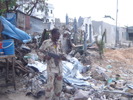
Violence between Somalia’s Transitional Federal Government (TFG) and the Islamist groups Shabaab and Hizbul Islam continues in Mogadishu today. Fighting has displaced an estimated 46,000 people and killed more than 150, with thousands of civilians still caught in the crossfire. Recent reports note that the TFG is attempting to quash a rebel offensive that began earlier this month.
This surge in violence was discussed on Capitol Hill this week, during a Senate Foreign Relations Africa Subcommittee hearing addressing the crisis in Somalia. Witnesses at the hearing included Ambassador Johnnie Carson, the newly-minted Assistant Secretary of State for African Affairs, Shannon Scribner from Oxfam America, and Ken Menkhaus, a professor of political science at Davidson College and author of Enough’s most recent report on Somalia. The experts covered a wide range of issues regarding Somalia’s current humanitarian crisis. Committee members and panelists emphasized that attention must be paid to the situation on the Horn. However, they also demonstrated their understanding that while U.S. policy towards Somalia must support the TFG and work for increased security and improved governance, the complexities of the challenges in Somalia warrant a well-developed and comprehensive response so as to avoid provoking an even greater flare-up and more deeply entrenched sympathies toward the Islamist factions vying for power. Much of the discussion at the hearing focused on generalities, but the proceedings offered some useful insights into administration policy and shined a light on what looks to be the development of a new and improved U.S. strategy.
Renewed attention from the United States certainly couldn’t happen soon enough for, as my colleague Colin Thomas-Jensen recently pointed out, the recent onset of an acute drought – which many predict will be the worst in a decade – paired with the uptick in violence makes the outlook for Somalis ever more grim.

